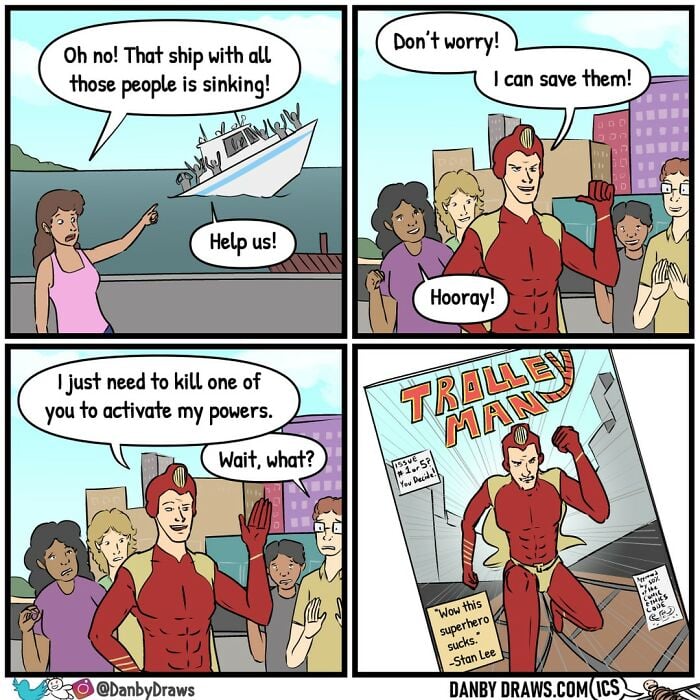this post was submitted on 15 Nov 2024
1335 points (99.3% liked)
Comic Strips
12607 readers
4908 users here now
Comic Strips is a community for those who love comic stories.
The rules are simple:
- The post can be a single image, an image gallery, or a link to a specific comic hosted on another site (the author's website, for instance).
- The comic must be a complete story.
- If it is an external link, it must be to a specific story, not to the root of the site.
- You may post comics from others or your own.
- If you are posting a comic of your own, a maximum of one per week is allowed (I know, your comics are great, but this rule helps avoid spam).
- The comic can be in any language, but if it's not in English, OP must include an English translation in the post's 'body' field (note: you don't need to select a specific language when posting a comic).
- Politeness.
- Adult content is not allowed. This community aims to be fun for people of all ages.
Web of links
- !linuxmemes@lemmy.world: "I use Arch btw"
- !memes@lemmy.world: memes (you don't say!)
founded 1 year ago
MODERATORS
you are viewing a single comment's thread
view the rest of the comments
view the rest of the comments

The artist just immortalized in a strip that does not understand the trolley problem.
It understands it just fine. Agency is not a factor in the decision. The choice between action and inaction doesn't matter. People think it matters because people are driven by shortsighted emotions.
I think the thing that people often don’t seem to understand about the trolley problem is that it doesn’t have a “single version”, it’s a framework for exploring human decision making. And the correct answer, it’s all a matter of perspective. For example, if all of drag’s friends were on one side of the track, and on the other side of the track, were a number of people who drag does not know, equal to the number of drag’s friends plus one, would drag kill their friends, or the innocent people?
Drag's friends. Drag has at least ten friends probably, and drag's friends are at least 10% better than the average rando. They're mostly communists and queers. The world is better off with them in it than with some random people who are probably capitalists.
Thank you so much for being honest about making that choice - almost everyone would choose their friends, but lots of people wouldn’t admit to that. Being honest myself, I’d make the same call - and if it came down to me picking between my friends and drag’s friends, I’d choose my friends. The whole “calculus” we run (comparing how good our friends are to average people) is a way we justify making our decisions, a way to deal with the cognitive dissonance of our values (save as many lives as possible) being in conflict with what we actually do (saving our friends rather than as many lives as possible). In reality you would have no way of knowing who those other 11 people would be - for example, if I said that one of them is a researcher on the brink of curing cancer, how would that change your decision? These are really tough questions to deal with, and that’s the point of the trolley problem - that people make different choices because they have different perspectives, and different values. There’s no objectively right and objectively wrong answer to any of the scenarios. Just different interpretations and ways to think about it.
Drag chooses to kill those people because drag knows nothing about them. Drag just assume they're randos. And on average, people suck. Drag's friends are great people.
If drag knew more about the people, the equation would change. Drag finds it difficult to reason seriously about a scientist discovering a cure for cancer, since there's no such thing. There are hundreds of cancers. There's no one solution for all of them and there never will be. We'll need hundreds of cures for cancer, many of which we already use today.
If we went with a more realistic scenario, like "one of those people will be the leader of the USA's communist revolution", drag would be much more willing to kill drag's friends. Drag might also commit suicide about it, though, so maybe the numbers aspect is equal anyway. Would drag give drag's life and all drag's friends' lives away for a communist America? Probably, but drag would sure like some assurance it's going to be proper anarchist communism, and drag wants to know if another leader could have taken that place. Does drag even believe in the "great man" approach to history, or is there no such thing as such a leader? Is there nobody that important?
That’s perfect, drag, I don’t think anyone could have put it better. The trolley problem is a philosophical thought experiment, yet so many people approach it like it’s some sort of engineering problem that has right and wrong answers, I think it’s probably a consequence of our sort of “tech bro” culture that everything needs to fit into this rational, quantitative framework - we have this drive to put numbers on things that just can’t be rationalised in that way.
People are funny, complicated things, and I love them all!